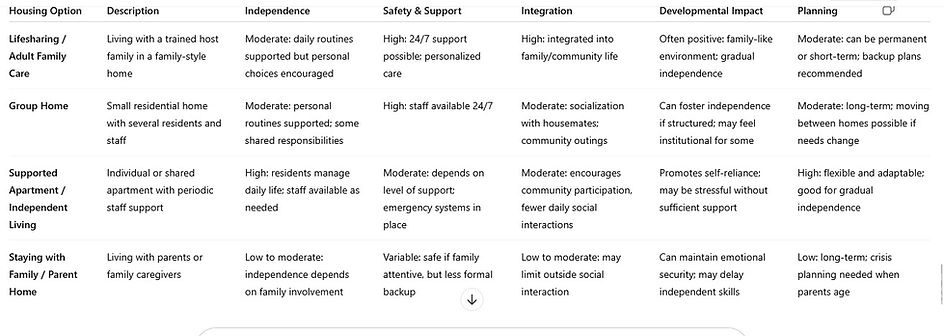Helping Your Teen with Autism Transition to Adulthood:
What Parents Need to Know
Transitioning from high school to adulthood is a big step—especially for teens with autism. As a parent, you play a vital role in preparing your child for life after high school. Here’s what you need to know to make the journey smoother.
1. Understanding the Transition Process
-
When it starts: Transition planning begins by age 14 (sometimes earlier) as part of the IEP.
-
Purpose: To help your teen prepare for adult life, including work, college, independent living, and community participation.
-
Team effort: You, your teen, teachers, and specialists all work together to create goals and plans.
2. IEP Goals Focused on Transition
Your teen’s IEP will include new goals to prepare for adulthood.
These might cover:
-
Job skills: Learning to apply for jobs, interview, and keep a workplace routine.
-
Higher education: Preparing for college classes, support services, or vocational training.
-
Daily living skills: Cooking, budgeting, personal care, transportation.
-
Social skills: Building friendships, communication, self-advocacy.
-
Community involvement: Using public transportation, volunteering, or joining clubs.
3. Preparing for College or Vocational Training
-
Research options: Look at colleges, community colleges, trade schools, or job training programs that offer support for students with autism.
-
Visit campuses: See what accommodations they provide, such as tutoring or counseling.
-
Plan early: Make sure transition goals include skills for success in the college or training setting.
-
Get help: Many schools have disability services offices to help students with accommodations.
4. Getting Ready for a Job
-
Explore interests: Help your teen discover what kind of work they enjoy.
-
Build skills: Practice punctuality, following instructions, and teamwork.
-
Work experiences: Look for internships, volunteer opportunities, or part-time jobs.
-
Understand workplace rights: Your teen can learn about workplace accommodations and protections under the law.
5. Understanding How Services Change After High School
-
School services end at 21: After that, services through the school system typically stop.
-
Adult services start: Your teen may qualify for support through adult agencies (like vocational rehab, social services, or Medicaid waivers).
-
Get connected early: Begin learning about adult service options by age 14 or 16.
-
Guardianship and decision-making: Discuss future legal rights and supports for your teen.
6. Planning for Finances
-
Benefits: Understand Social Security benefits, Medicaid, and other assistance programs.
-
Supported decision-making: Help your teen manage money or consider a representative payee.
-
Financial planning: Think about savings plans or trusts that protect benefits and support your teen’s future.
7. Where will I live?
-
Encourage: Lifeskills in all areas, create functional IEP goals, reach out to organizations for help.
-
Evaluate supports: How much support is needed to function independently on a daily basis? The more supports that are needed will help you choose the best type of house/lifestyle.

8. Tips for Parents
-
Involve your teen: Encourage them to participate in their IEP meetings and decisions.
-
Start early: The more time you have, the better prepared your teen will be.
-
Ask questions: Don’t hesitate to talk to teachers, counselors, and adult service providers.
-
Stay organized: Keep track of paperwork, appointments, and deadlines.
How can I learn more about transition programs?
-
If you're a parent or professional in the Lehigh County area, get involved in the quarterly Carbon Lehigh Transition Coordinating Council Meetings at the IU Administration Building in Schnecksville, PA. For more information, click here.
-
Click here for Transition programs in Northampton County IU20.